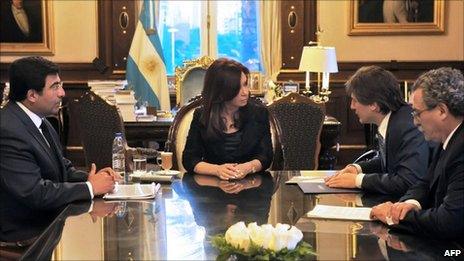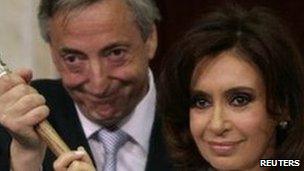Kirchner death leaves Fernandez to run Argentina alone
- Published

President Fernandez has had little time to grieve before returning to work
There are few who would envy Cristina Fernandez de Kirchner's situation right now.
The president of Argentina has a country to run. Yet she is still in mourning for her husband, Nestor Kirchner, who died last week, aged 60, following a heart attack.
Not only was he her predecessor as president and the man most likely to have succeeded her in next year's elections, he was also her political mentor and closest confidant.
Now she must show she can govern alone, in her own right, and respond to those who say she has been little more than her husband's puppet.
Nestor Kirchner died last Wednesday. President Kirchner was back at work on Monday, embroiled in the nuts and bolts of the job - receiving the credentials of new ambassadors to Buenos Aires.
'Hub of power'
In her first public address since her husband died, President Fernandez said on Monday: "I know that the good fortune of all Argentines rests with me. This is my most painful moment but not my most difficult."
On the verge of tears, she vowed to continue to honour Nestor Kirchner in what remained of her time in office.
Her address, carried on state-run radio and television, was brief. If the Argentine people were expecting more, they would have been disappointed.

The Kirchners were Argentina's power couple
"Nestor Kirchner was the hub of power and the decision-making process of government. With his death, the system of government in Argentina changed dramatically," says political analyst Jorge Castro.
"It is now much weaker than it has been for the past seven years. It's a system of power in which the power is not there."
Mr Castro believes that President Fernandez must recognise the change and pursue a policy of conciliation and negotiation rather than confrontation and polarisation with the opposition or he forecasts a crisis of government.
The main opposition groups have appealed to President Fernandez to take what they called a historic opportunity to lower the levels of confrontation and talk to one another.
Nestor Kirchner simply did not talk to those he felt he did not need to, including the media, the opposition, the then US President George W Bush.
Male-dominated society
In a country where the media is polarised and because neither Mr Kirchner nor President Fernandez gave interviews, it was always difficult to know to what degree she was making her own decisions.
Many opponents, and some supporters, alleged she was merely Nestor's puppet, keeping the presidency warm for him to run again in 2011.
The critics also asked how many of her ministers were appointed on Mr Kirchner's recommendation, and whether she enjoyed the support of the governing Peronist Party and the powerful trade union movement simply because of him.
These are all questions that the president is under pressure to answer in the coming weeks and months.
In what is still a male-dominated society, many still cannot quite believe that a woman can reach a position of such authority on her own, without her husband's backing.
The last woman to govern Argentina was Isabel Peron, who took over following the death of her husband, President Juan Domingo Peron, in 1974.
She was weak and manipulated and what emerged from the chaos that followed was a brutal military government that kidnapped and killed thousands of its own people.
The situation in Argentina is very different today.
But the void left by Nestor Kirchner's death is being filled with uncertainty as rivals within the governing party, opposition bosses, the trade union movement and leaders of industry meet to negotiate and manoeuvre.
Cristina Fernandez is under immense pressure to emerge from the shadow of her husband and to prove that she is independent of him, that she's her own woman.
Argentina is leaving her very little time to cry.
- Published27 October 2010
- Published27 October 2010
- Published27 October 2010
- Published30 October 2010
- Published27 October 2010